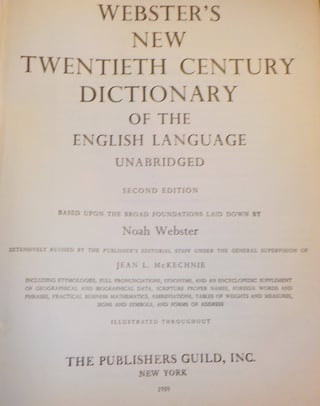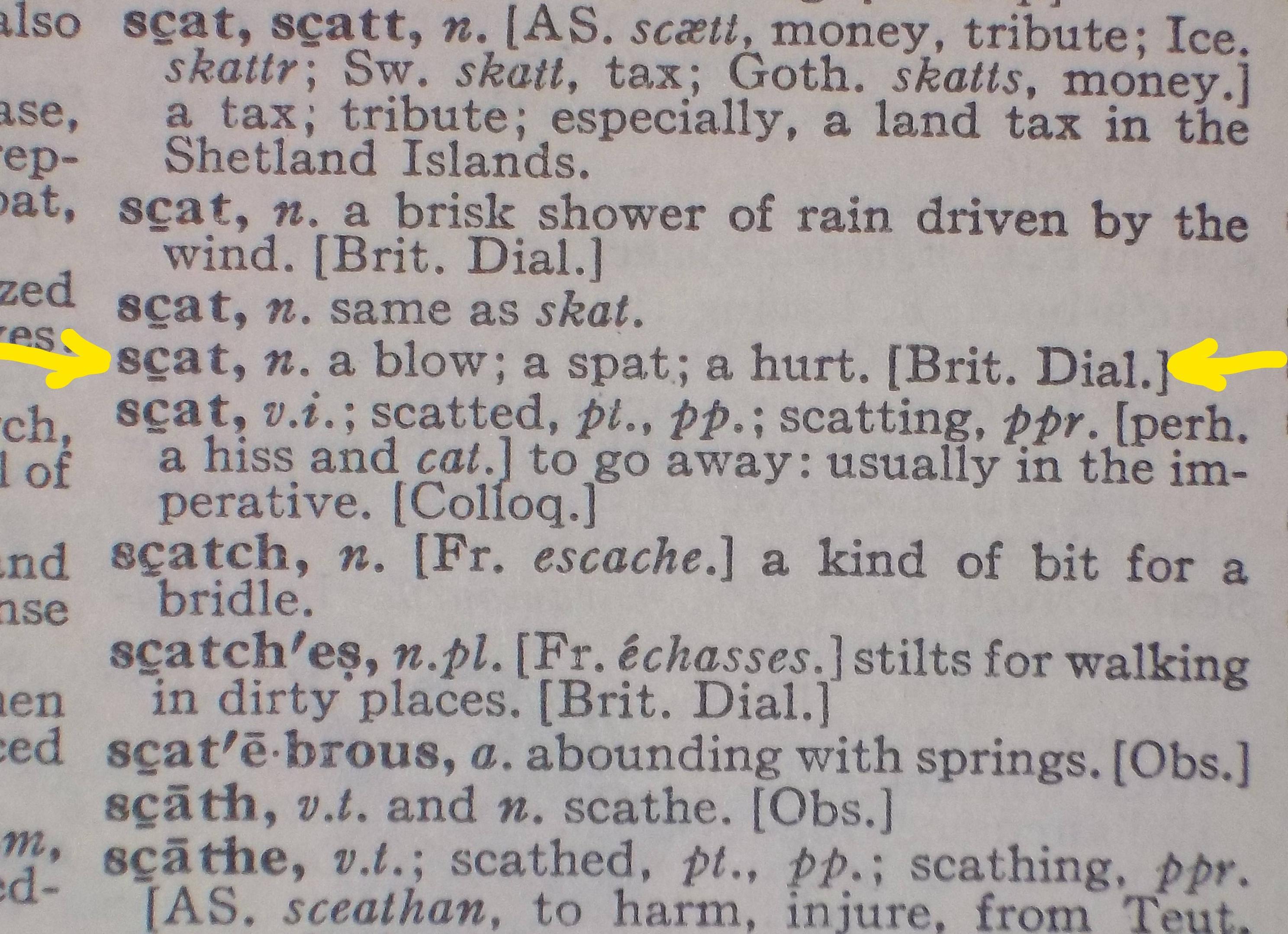Background
English 'schadenfreude', a noun attested from 1867 in OED, derives directly from German schadenfreude, a noun-noun compound. Schade meant "damage, harm, injury", viz.
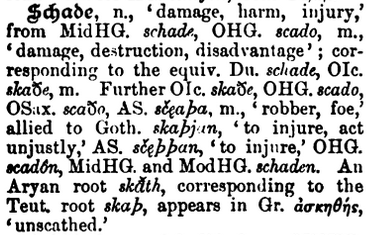
An etymological dictionary of the German language. By Friedrich Kluge, translated by John Francis Davis. The date of the (translated) author's preface indicates the gloss and etymological details stemmed from lexical work completed no later than 1888 and most likely completed before 1883.
Freude meant "joy, pleasure, delight", viz.

op. cit.
An Englished meaning of the schadenfreude compound is given by William Dwight Whitney in the 1877 edition of A compendious German and English dictionary as "pleasure at the misfortune of others, malignant joy", viz.
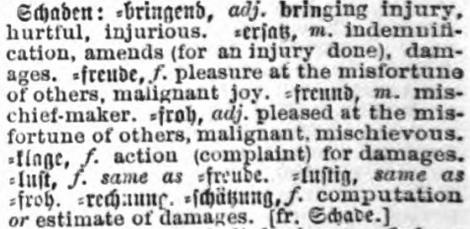
The English meaning given by Whitney in 1877 for the German compound schadenfreude is the meaning retained by the adopted English compound 'schadenfreude' to this day.
Schaden
This investigator accepts the original poster's suggestion that 'scathe' serves well for the first part of the desired "best etymological calque" compound, especially because OED's sense 2a (not shown as obsolete in an entry not "fully updated" since 1910) for "scathe, n." is
Hurt, harm, damage.
Although 'scathe' in this sense is in my estimation obsolescent today (except as found in the participial adjective 'scathing'), the poster of the question indicated that contemporary obsolescence was not at issue for a desirable answer.
Freude
Kluge, in particular, suggested a number of cognates that might be investigated while attempting to find what the original poster of the question announced in comments they were looking for, the investigation target also implicit in the question:
an obscure, obsolete or even Old English word that was derived from the same root as Freude.
The cognates suggested by Kluge can be supplemented from Deutsches Wörterbuch von Jacob Grimm und Wilhelm Grimm to include "freuen, MidHG", "vröuwen, OHG", "frouwen", and "ahd. frawida, frewida, frowida, mhd. vreude, vröude, nhd. bei".
An exhaustive search of the OED for "obscure, obsolete or even Old English" words derived from any of the cognates suggested by Kluge and the Grimms failed to bear fruit.
Bearing in mind, however, that the original question stipulated "comprehensibility" as of lesser importance than etymology and euphony, and also bearing in mind that there was no indication in the question that complete agreement with contemporary English usage should be desirable, Kluge's suggestion to "see froh" seemed worthwhile. Also, Whitney gave schadenfroh as the adjectival counterpart of schadenfreude, with the meaning "pleased at the misfortune of others, malignant, mischievous".
Froh is glossed by Kluge as "glad, joyous, happy" in English:
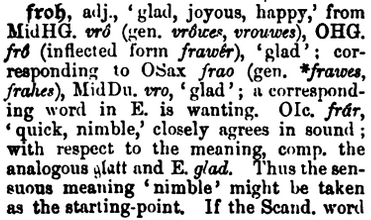

Kluge, 1891.
Leaping from freude to its reconstructed (that is, unattested) Proto-Indo-European root, *prew-, meaning "to jump, hop", and from there to a posited Proto-Germanic *frawaz, the English word 'frolic' is suggested as a descendant, via Dutch, Middle Dutch and Old Dutch.
OED gave the noun 'frolic' as deriving from either the verb or the adjective; the etymology of the adjective 'frolic' associates the Middle Dutch form vrô with the modern German froh.
Dutch vrolijk (in Kilian vrolick), = Old Saxon frôlîc (whence frôlîco adverb), Old High German frôlîch (Middle High German vrôlich, vrœlic, modern German fröhlich); < Middle Dutch vrô = Old High German frô (Middle High German vrô, modern German froh) glad, joyous.
(Bold emphasis mine.)
Of the etymology of the verb 'frolic', OED remarks that the second element, -licken (Flemish) or -lochen is "of obscure origin".
New Compound
The foregoing suggests that the neologistic compound scathe-frolic serves to answer the question of what, "using arguments based on etymology, as well as euphony and (least importantly) comprehensibility", is the "most etymologically faithful English equivalent for the German Schadenfreude?"
'Euphony', of course, may be considered a matter of personal taste or a matter to be settled by consensus; scathe-frolic sounds pleasant enough to my ear, and seems easy to pronounce. If, as I suspect, the original question meant by 'euphony' something more like sound-similarity than "pleasing and easy to pronounce", the phonic similarity of the first syllable of '-frolic' and the entirety of 'freude', while somewhat slantwise (at least in my pronunciations), is self-evident.
'Comprehensibility', the least important of the stipulations, is in my opinion largely determined by familiarity with the compound used with the particular meaning of "pleasure at the misfortunes of others, malignant joy". However, it might be argued that, absent knowledge of the intended meaning, 'scathe-frolic' would lend itself to, among other interpretations, interpretation as a synonym of 'algolagnia', active or passive or both, where 'algolagnia' is defined as
The practice of deriving pleasure, esp. sexual pleasure, from pain inflicted on oneself or others; the urge or tendency to derive pleasure in this way. Cf. SADOMASOCHISM n.
Often divided into active and passive algolagnia, corresponding to sadism and masochism respectively.
OED
Other possible interpretations, again absent knowledge of the intended meaning of "pleasure at the misfortunes of others, malignant joy", might involve association with, for example, unlucky outcomes for extreme sports. I suggest, though, that once the intended meaning has been associated with the term, it will come to seem natural — at least as if not more natural than that meaning associated with 'schadenfreude'.







